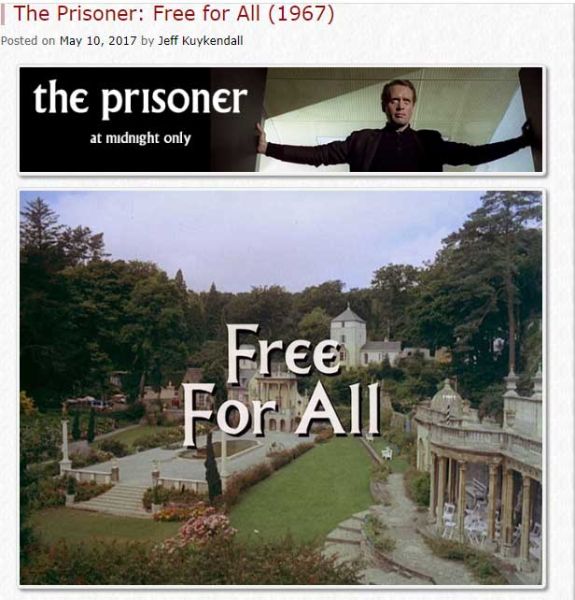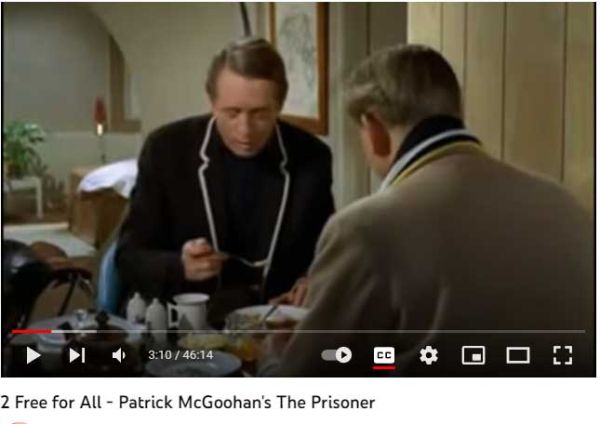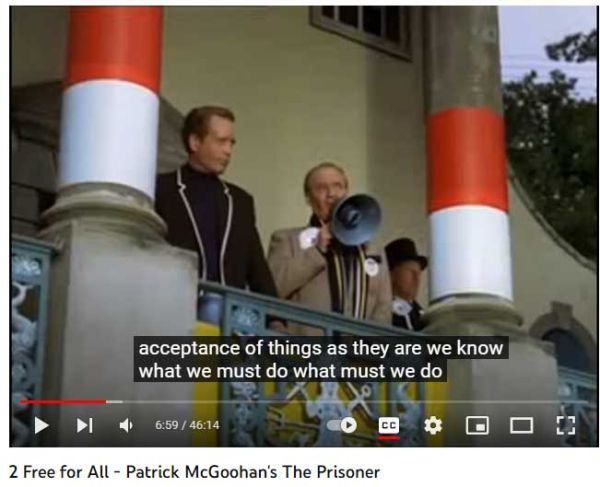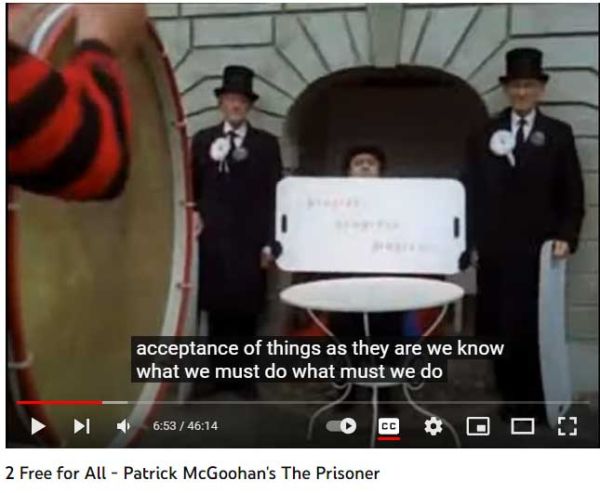The Prisoner Runs for Mayor
Maybe the War in Vietnam brought the Counterculture into existence. The War had cost the lives of Americans since early in the 1960s; and it just went on and on. More than that, the War led to doubts about the political status quo, the wisdom of our leaders, and the goals of their policies. Artistic types expressed their angst and skepticism in movies and TV shows of extremely variable quality.
The labelling of 1967 as the "Summer of Love" may have sold Beatles records, but '67 also resulted in a Countercultural slap in the Establishment-face, with TV programs like The Prisoner, starring Patrick McGoohan. Prisoner ran for seventeen episodes and really touched a sore spot in the culture. I remember seeing it after I finished college in 1976, thanks to the Public Broadcasting Corporation, which ran it several times.
I have several favorites in The Prisoner series, and "Free for All," filmed in October, 1967, is one of them. It also sort of unnerves me, so I have to watch it. The series begins with the resignation of an unnamed British Secret-Service officer who attempts to flee the country. Instead, unnamed men render him unconscious and carry him to an unknown island they name "The Village," and name the renegade agent "Number Six." They try to make him confess his reasons for leaving the Service. Heading The Village's efforts is "Number Two," who refuses to tell the renegade who "Number One" is.
Other residents in The Village covertly assist the interrogators to deceive Number Six. The interrogators also use drug-therapy, intimidation, and occasionally violence in an effort to make him confess. But surrealism and fantasy also tinge the episodes. They make powerful bedfellows--the Counterculture and Surrealism, both in television-viewing as well as music. They suggest that we apply skepticism and psychology to our perception of the World.
In "Free for All," Number Two suggests to Number Six that he enter the election to become the new Number Two. "Don't you want to run?" Number Two asks.
"Like the blazes," Number Six replies, "away from here."
Scarcely batting an eye, Number Two corrects him and tells him that he wants Six to run against him to become the new Number Two.
"What happens if I win?" Six asks.
"You become the boss," Two replies.
"Number One is the boss," Six corrects him.
While Number Two waves at his supporters, he tells Number Six that a unanimous vote is bad for morale. Few in the Village appreciate the importance of a free election. "They think it's a game."
Six replies cooly, "Everyone votes for a dictator." He again poses the question, what happens if he wins.
"We'll see how you feel after assessing the madding crowd."
Number Two addresses the people of the Village and warns them that the lack of opposition in free elections is not good, as it reflects an acceptance of things as they are. "We know what we must do," Two continues. "What must we do?" Number Two's butler holds up a sign which reads "Protest! Protest! Protest!" Incredibly, the crowd obeys the butler: "Protest! Protest! Protest!"
Number Two hands the microphone to Number Six who speaks sternly, saying "I am not a number! I am a person!" But the villagers just laugh him to scorn.
Film critic Jeff Kuykendall writes mostly from a sci-fi viewpoint and says that "'Free for All' speaks of the Counterculture's mistrust of its elected representatives, viewing them as cogs in the machine, incapable of implementing real change." Kuykendall concludes that "it is the system that must be remade through revolution."
I disagree. I see a public that remains more or less dependent on its spokespersons in the political party, in social groups, and in media outlets. Number Two, presumably the spokesman of the system, exhorts the villagers to "Protest!" They just parrot his words. When the Prisoner tries to exhort the villagers to freedom and self-determination, they just laugh at him. They don't need freedom and self-determination. They need orientation and a value system that will identify them.
McGoohan, who wrote the screenplay to "Free for All," designed it more as an existential plea for understanding of the personal limits of people. Watching the villagers parrot their lines, I could not help but feel sorry for them. The average American is looking at himself.




